|
We are happy to have 10 interns from the Univeristy of North Carolina Wilmingtion with us this spring! Let's meet them!
My name is Morgan from Red Springs, N.C. I'm a Senior Biology major w/ concentration in Pre-Vet and minor in Anthropology. I've been working as a Veterinary Assistant for 3 years and I volunteer and manage social media for several wildlife organizations. I'm Macy from Charlotte, N.C. I'm currently a senior at UNCW and majoring in marine biology. I chose this internship because I have a deep passion for marine life, so I love having the opportunity to help the sea turtles here! Hey! My name is Madison and I’m from Greensboro, NC! I’m a senior and my major is Marine Biology. I love sea turtles and I want to do something like this as a future job! I've also heard great things about this internship through friends and other UNCW students. I love the beach, sunsets/sunrises, hanging out with friends, and shopping! My name is Luke and I’m a junior at UNCW. I’m from Montgomery County, Pennsylvania. I am a Biology major with an interest towards conservation/sustainability. I chose this internship to hopefully gain experience working with endangered species as well as to build connections to further my future in the biology world. Also, turtles are very cool. I’m RJ from Cincinnati OH. I’m a junior at UNCW majoring in Marine Biology. I run a YouTube channel for fishing and fish keeping. I have 1000 gallons of water in my basement back home and love everything aquatic. My name is Andrew. I’m from Maryland and this is my third year at UNCW. I’m majoring in Marine Biology. I love fishing and am part of the UNCW rowing club. My name is Tyler. I am a sophomore at UNCW from Summerfield, North Carolina. I am double majoring in Marine Biology with a concentration in Marine Conservation & International Studies with a concentration in Environment. I chose this internship to get a more medical approach to hands-on experience to further my own conservation work portfolio. I love to surf, chase sunrises & sunsets, and I love to go backpacking. I’m Brianna, a 20-year-old sophomore majoring in Marine Biology from Pittsburgh, Pennsylvania. I have a concentration in Conservation as well as a double minor in Neuroscience and Oceanography. I have always grown up wanting to work with turtles and work in marine mammal rescue, strandings and necropsies. Therefore, I wanted that experience but with a sea turtle hospital, especially since my goal for a future career is to work in marine rehabilitation. I love outdoor adventure activities as well as cooking, reading and writing my own music. Coffee shops are my favorite place to hang out and I love to travel. Hi, my name is Lauren! I am a Marine Bio and Pre-Vet major. I am from Kernersville North Carolina and I plan to become an aquatic animal veterinarian! I love to watch sunsets, go to coffee shops, and spend time with my pets! I have two dogs, a cat, and a fish! After gaining experience working with dogs and cats at a veterinary clinic, I knew that the world of veterinary medics was the place for me! Working at this internship allows me to gain experience for vet school and help care for a species I love and want to help protect! My name is Chrystal. I’m a UNCW senior majoring in Biology, Pre-Vet. I chose this internship because I have done a little of everything with land animals and would like to learn a little about sea creatures. I volunteer with All 4 Cats and Paws 4 Purpose Rescue when I can. I write medical protocols for All 4 Cats and I transport animals for Paws 4 Purpose, as well as trap neuter, vaccinate and return cats in all of Onslow and surrounding areas.
0 Comments
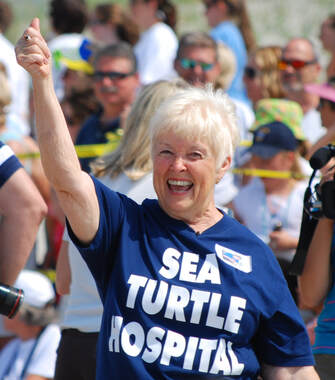 Throughout 2023, we celebrated our 25th anniversary! After many years of protecting and conserving turtles, first as the mother-daughter team of Jean and Karen Beasley and then as the all-volunteer Topsail Turtle Project, we decided to make it official 25 years ago, in 1998! On June 5, 1998, Jean Beasley filed articles of incorporation with the State of North Carolina to legally establish the Karen Beasley Sea Turtle Rescue and Rehabilitation Center as a non-profit organization. Named in memory of her daughter, Karen, the "KBSTRRC" would include both the existing Topsail Turtle Project and the new Sea Turtle Hospital. On July 21, 1998, the North Carolina Secretary of State approved KBSTRRC's articles of incorporation and we officially became a legally-recognized, not-for-profit organization! Since our founding, we have protected over 2,627 sea turtle nests, treated over 1,307 sick or injured sea turtles, and educated hundreds of thousands of people about sea turtles and the importance of conserving them. To celebrate, we hosted 25+ activities and events to celebrate 25+ years of conserving and protecting sea turtles. From the Gala to our "Lights Out for Sea Turtles" campaign, we found a lot to celebrate! 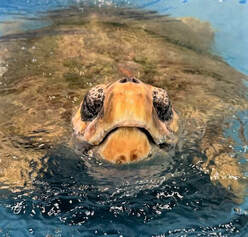 Greetings from Titanite! Greetings from Titanite! By Karen Sota We love every turtle that comes to us for care and hopefully a second chance. But right now a sizable adult loggerhead lady has stolen our hearts. “Titanite” was rescued from a research pound net on July 15th and it was immediately apparent that she had been the victim of a brutal shark attack, and a fairly recent one at that. She was missing a portion of her right front flipper, had large bite marks in her neck and it looked like she had lost one of her “toes.” Her carapace was bitten through, but luckily it was near the edge and the bite did not penetrate the coelomic wall where the organs are located. And her eye looked like it had a possible laceration. She was a tragic sight. After being settled in a shallow tank in Sick Bay Titanite began what looked to be a long period of recovery with intensive and frequent hands-on care by our staff. Obviously she was in pain, especially around her neck, and would give us the side-eye when we approached that area. She was kept as comfortable as possible with pain medication and her wounds were treated with a variety of topical and injectable meds to prevent infection and facilitate healing. 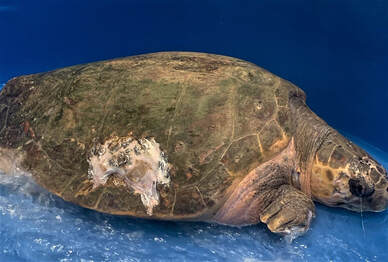 Titanite shows the amazing healing of her wounds. Titanite shows the amazing healing of her wounds. Titanite was not able to go on to our recirculating water system in Turtle Bay until she had gone through quarantine, so for her first six weeks her water had to be changed up to five times a day. She received treatment for three of those water changes, including flushing with saline and betadine, a honey soak on the wounds and application of SSD. And we still had a problem where her flipper was bitten off – there was a portion of the bone sticking out that needed to be surgically addressed – but not until she was stabilized. Thankfully she was a good eater, and thankfully not a picky one like our Kemp’s tend to be. She was happy with whole mackerel until apparently word had gotten to her that if there was something about the breakfast preparation not to her liking we would be happy to accommodate her. She started biting off the heads and spitting them out on the bottom of her tank. Now her 3,000 grams of mackerel arrives sans heads. It doesn’t take long for them to train us. Several weeks ago, Dr. Harms and his class of 4th year vet students arrived and Titanite was scheduled for her surgery. The protruding bone was carefully trimmed back and the wound was stitched and then bandaged with a compression bandage to minimize bleeding. Her other wounds were debrided and were showing signs of healthy tissue repair. She was placed back in her tank and back on meds for pain and infection. It wasn’t long before she was swimming around probably wondering what that thing was on her flipper. She was eating and back to her new normal of hands-on treatments the next day. Her progress has been astounding. 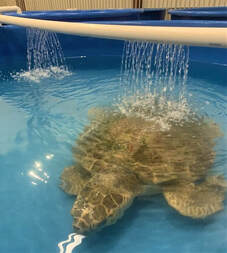 Titanite in her new digs enjoying her waterfall Titanite in her new digs enjoying her waterfall Titanite has relocated to Sea Turtle Bay in a large tank with recirculating water to facilitate her healing and minimize handling by our staff. And our water guru, Tina has installed a “waterfall” that she can rest under for a quick nap or carapace massage. Titanite is currently being treated once a day and still insisting on headless mackeral. You can see her from a distance from our observation ramp when you come to visit us. We’ve now on our fall tour days and hours, and we still have patients waiting for your visit. There are major renovations scheduled for late fall, so be sure to buy your tickets soon before we close. Our hospital matriarch “Snooki” is eagerly anticipating the arrival and installation of her new fifteen-foot tank, complete with a window! Please keep an eye out for any sea turtle activity on the beaches or in the water. As the nests continue to hatch it’s possible you’ll find a hatchling that’s gone astray. Carefully pick it up and put it in a small container with some sand and a very small amount of water - barely cover the flippers. It’s important that the little critter does not bake in the sun, or sit exposed to the elements/predators when we get these unexpected night temperature drops into the 50’s. Then call our Director of Beach Operations, Terry Meyer at: 910-470-2880. Calls to her number after hours will automatically be forwarded to her for action. You may also call the hospital during operating hours: 910-329-0222. We will take the information and one of our area coordinators will meet you to retrieve the hatchling and refer it to us for follow-up. Terry is also the contact for any sick, injured or pier-hooked turtle. The State of NC turtle hotline for strandings picks up 24/7 at 252-241-7367. Remember that interfering with or harassing federally protected sea turtles in any way makes you subject to steep fines and possible imprisonment. Our work with sea turtles, at the hospital and on the beach, is authorized by the NC Wildlife Resources Commission, ES Permit 23ST05. We are fortunate once again to have 8 students from UNC-Wilmington with us for the next few months. Let's meet them:
Hello my name is Kailynn and I am a senior at UNCW majoring in biology with a minor in assistance in dog training. I am from Apex, North Carolina and moved down here for college. I absolutely love all animals and wanted to learn more information and hands on experience with marine life! I am currently working as a vet assistant, and I am hoping to go to vet school! Athena - I am a junior at UNCW majoring in Biology and minoring in Marine Biology. I am from a small town called Jefferson, North Carolina. Which is close to the beautiful New River and Blue Ridge Parkway, growing up surrounded by nature and wildlife. This summer I worked at the New River State Park as a park attendant. I hope to find another summer job either in a state park again or at a national park but to be on the coast or on Saint John, USVI. I have a deep love for protecting wildlife and our environment. Although this internship isn’t related to my career goals, I am so happy to be doing this type of work as my personal passion. After having experienced this amazing opportunity, I hope to continue volunteering to help sea turtles. " Hailee - I am from the Outer Banks, NC. I am currently a junior at UNCW with a Biology major, concentrating in Pre-Veterinary Medicine with a minor in Assistance Dog Training. Coming from a beach town, I am very familiar with the ocean and its marine life. As such, working as an intern for KBSTRRC felt like the perfect fit for me! I have always loved sea turtles, and working with them now is such a privilege. This experience will be especially helpful in determining what kind of veterinarian I want to become. Jena - I am currently a senior at UNCW and am from Hillsborough, New Jersey. I will be graduating this spring with a BS in marine biology with a concentration in conservation. I have always wanted to work in rescue and rehabilitation and am so grateful to have this experience at KBSTRRC! I can’t wait to learn more about the care and conservation of sea turtles through this internship and hope I continue to do so in my future career. Phoebe - I am from Jacksonville, NC and I am a senior at UNCW. I am majoring in biology and minoring in chemistry. I was excited to learn about this opportunity and I am so grateful to be chosen as one of the interns this semester. As an aspiring veterinarian, I look forward to being able to work with the sea turtles so I can diversify my experience and help the animals as well. Matt - I am from Cary NC, and currently a senior at UNCW for a degree in marine biology. I have always been around the water and it's exciting to be turning that hobby into a possible career. KBSTRRC is such an awesome opportunity to be hands on with the turtles and I am learning so much. Sea turtles are such amazing animals and I feel very lucky to be a part of this great crew! Kira - "I am from Asheville, North Carolina and I am a second semester junior at UNCW. I am a marine biology major with a conservation concentration. My plan is to continue with school after completing my undergrad and getting both my master's degree and PHD in marine biology. I would like to use my schooling and this internship to obtain a job that allows to me to work with these animals in my career and making the ocean a safer place for them. I am so happy to be an intern at the Karen Beasley Sea Turtle Hospital and getting to work with these beautiful creatures to help spread awareness." Kayleen - I’m from Jacksonville, NC and currently I am majoring in Marine Biology with a concentration in Marine Conservation. Throughout my life I have always been traveling and gaining new experiences. While living in Nicaragua I was able to help a rehabilitation center release sea turtle hatchlings and this experience was a major influence in pursuing my degree. I graduate this semester and plan on continuing to gain experience within marine conservation so hopefully one day I can work with a facility just like this one. I’m thankful to have the opportunity to be an intern here since I will be able to have hands on experience with endangered species and share the importance of conserving them to the public.  Jakob, Justin, Jordan, Annika, Autumn, James, Chloe, Preston, Mason (lead), Hope Jakob, Justin, Jordan, Annika, Autumn, James, Chloe, Preston, Mason (lead), Hope This year, we are celebrating the 25th Anniversary of the Karen Beasley Sea Turtle Rescue and Rehabilitation Center's legal incorporation as a nonprofit organization. For most of our history, interns have been critical to our success. In fact, "to provide an experiential learning site for students of biology, wildlife conservation, and/or veterinary medicine from around the world" is written into our Mission Statement. So who are these intrepid interns that are making up our 25th Anniversary summer team? In their own words, here they are. Hi! My name is Mason (lead) and I recently graduated from the University of North Carolina Greensboro with a degree in Biology with a concentration in Environmental Sciences. Throughout my life, I have always been drawn to all things in the natural world, but I rarely had the opportunity to delve into nature as much as I would have liked. I spent seven years volunteering at my local aquarium, where I would help take care of dozens of different species, but I always knew I would want to extend that knowledge further into the natural landscapes. When I started performing research in wetlands during my undergraduate education, I saw just how interconnected the natural world was and this sparked my wonder for how other ecosystems function as well. After taking multiple classes in marine biology and sea turtle conservation, I learned just how critical sea turtles are to the health of several important ecosystems. Then, I had the honor of visiting KBSTRRC with my class and I fell in love with the sea turtles and what the hospital stood for. Once my instructor told me that there is an internship working with these magnificent creatures for the summer, there was no doubt in my mind that I knew it was something I wanted to pursue. I hope to utilize all that I learn this summer as I go on to explore the wonders of coastal ecosystems and follow my aspiration to work in habitat restoration. Hey, my name is Aishah. I’m from Atlanta, Georgia and attended the University of Georgia. I majored in marine biology and minored in ecology. I’ve always had a special interest in marine life growing up in Indonesia. I have dedicated myself to conservation volunteering in my local community stream cleanup. I hope to become a field researcher studying behavioral ecology in marine invertebrates. The KBSTRRC has shown me a different side of conservation caring for individual animals instead of the entire ecosystem. Hello, my name is Annika and I am originally from Joplin, Missouri. After graduating high school, I moved to Pittsburg, Kansas to complete a bachelor's of science degree at Pittsburg State University with an emphasis on wildlife ecology and a minor in music. Fall 2023 will be my last semester before graduating in December. After finishing at Pitt State, I plan to enroll in a Veterinary Technician program so that I can continue exploring the medical aspect of wildlife conservation in a professional setting. My goal is to work in marine mammal rehabilitation, specifically with seals. I have always had a love for marine life and through my previous experience with birds, seals, dolphins, and sea turtles I have discovered my passion to conserve, protect, and care for our oceans. When I learned of the KBSTRRC internship, I knew it was something that aligned with my future plans and would provide me with valuable hands on experience in sea turtle care. I am excited to see what the rest of the summer holds! Hi! My name is Autumn and I am a junior at Saint Francis University studying Aquarium and Zoo Science and a double major in Psychological Sciences. I’m also minoring in Biological Diving, American Sign Language and Animal Assisted Health and Education. I grew up in upstate New York about 30 minutes north of Syracuse. I didn’t have much experience with marine life, but I would visit the Wilmington area and Estero, Florida where I would see marine life. I had not heard about KBSTRRC until summer of 2022 and then when I visited in the Fall I fell in love with the place and the mission they have. I decided about 3 years ago that I wanted to do sea turtle rehabilitation. Moving forward I would like to work in marine rehabilitation but hopefully I can work in sea turtle rehabilitation. I am super excited to have this opportunity to pursue my dream career with these amazing people at my side:) Hi! My name is Chloe, and I’m from Northern Kentucky. I am entering my senior year at the University of Louisville, Kentucky. I have an Individualized Major, comprised of concentrations in Art, Biology, Sustainability, and Environmental Sciences. I am pursuing a career in wildlife rehabilitation and conservation. Throughout my previous experience working with animals, there has been a strong emphasis on education and the importance of this in wildlife conservation. Encouraging the general public to connect with animals and their stories through education is what inspired my interest in this kind of work at a young age, along with so many others! Helping animals and seeing visitors resonate with the hospital’s message is incredibly rewarding. Through my internship with the KBSTRRC, I have found a career that blends the conservation education that I find so important and the wildlife rehabilitation work that I love! I am thankful and excited to be part of the Summer 2023 intern team! I'm Hope, and I'm from Greensboro, North Carolina, and I am an alumnus of UNCG and received my degree in Biology and a minor in Information Technology. However, my yearning and curiosity of animal’s pushed me to pursue wildlife conservation and rehabilitation. I took a sea turtle class at UNCG, and we visited the a couple of times during our semester; after seeing the hospital's positive effects on its sea turtle population, it inspired me to apply for this internship. I'm ecstatic about this opportunity. I'm excited about everything I will learn from the turtles and the people here. After my time at the hospital I hope to continue gaining experience rehabbing and conserving animals around the world to prompt my higher education.
Hello, my name is Jakob. I am from Stoughton, Massachusetts and I am currently a graduate student from Unity College. For years, I have had an interest in working with marine mammals and rehabilitating them. So ever since middle school I have been working towards a career in that specific field. As such I am pursuing a Master’s in Marine Science with the Conservation of Marine Mammals track for the graduate program. While my focus is on marine mammals, I have a passion for working with all animals. Interning at Karen Beasley Sea Turtle Rescue and Rehabilitation Center is currently the closest thing to what I want to do for my life, and I believe it is the next step for my career. Hi my name is James. I am from Garner NC. I am going into my senior year at UNC Wilmington. I am majoring in Marine Biology and minoring in Music. As a kid I always knew I would work with animals when I got older. At first I wanted to be a veterinarian for domestic animals, but I was later introduced to what a cuttlefish was and I was hooked. My fascination for cuttlefish and other cephalopods sparked my interest into becoming a marine biologist. While I am still interested in cephalopods I wanted to do something that would involve me being hands on with marine animals. Even though I am torn between conservation of sea turtles and doing research on cephalopods I am honored to be interning with the KBSTRRC this summer. Hey! My name is Jordan and I was born and raised in Chicago, but spend most of my time in Columbus, Ohio where I’m studying Zoology at The Ohio State University. I’ve always been interested in animals but have a specific curiosity with large mammals, which probably comes with growing up in such a big city where I rarely saw them. After working with various shelters and at the accredited John G. Shedd Aquarium at 16, I became interested in conservation as a serious career path. After I graduate in a couple of years, I want to go into rehabilitation specifically as it relates to human impact and wildlife crime, and use behavioral research to make strides in transitioning large numbers of animals from captivity back to their homes in the wild. I'm Justin and I am from Fuquay-Varina, North Carolina! Currently a senior at the University of Miami double majoring in Marine Science and Biology. Sea turtles have always been a passion of mine for as long as I can remember, and ever since I was sea turtle camper back in high school I knew that I wanted to work at the Karen Beasley Sea Turtle Hospital one day. So, being able to be an intern this summer is a dream come true. I plan on using this incredible opportunity to aid in my goal of becoming a sea turtle researcher using skeletochronology techniques to learn more about sea turtle foraging patterns, diet and behavior, to further advance conservation efforts of these magnificent creatures. My name is Preston, and I am from Wilmington, NC. I recently graduated from Rhodes College with a B.A. in business and a minor in history, where I also played men’s lacrosse. I am attending UNC-Wilmington this fall to finish my prerequisites for veterinary school. Animal care has been a passion of mine since working at the Eastern Carolina Veterinary Referral and volunteering at the Memphis Zoo. This is my first time working with marine life, but I enjoy it a lot. Helping animals with different medical needs makes the whole experience worthwhile and I am incredibly thankful to be a part of an organization that actively helps sea turtles in need and rehabilitates them until they are able to be released. |
Archives
February 2024
Categories |
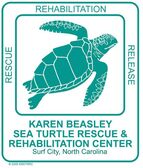
|
Quick Links |
Visiting Hours
THE TURTLES WELCOME YOU!
CLICK HERE FOR INFORMATION. ADMISSION (PLUS sales tax & fees): $7.00 General Admission (Ages 13-61) $6.00 Military (Active Duty and Veterans) $6.00 Seniors (Ages 62 and up) $5.00 Children (Ages 3-12) $0.00 Babies and Toddlers (Ages 0-2) (Babies are free but a ticket is still required to save their spot!) |
We are a 501(c)(3) Non-Profit Organization - POWERED BY VOLUNTEERS
EIN: 56-1967579
This conservation work for protected sea turtles at the Karen Beasley Sea Turtle Rescue and Rehabilitation Center and on Topsail Island is authorized by the North Carolina Wildlife Resources Commission, ES Permit 24ST05.
©
2024 Karen Beasley Sea Turtle Rescue & Rehabilitation Center
Powered by Volunteers!
Website Design by Loggerhead Designs
Powered by Volunteers!
Website Design by Loggerhead Designs

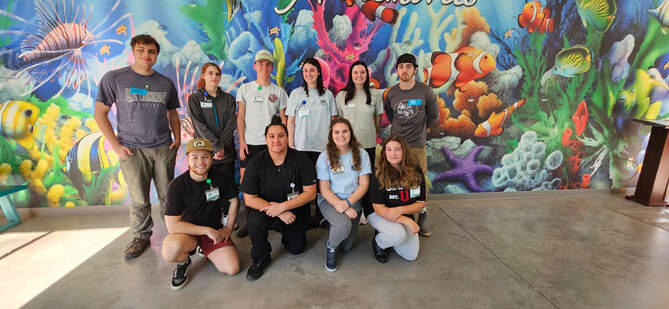
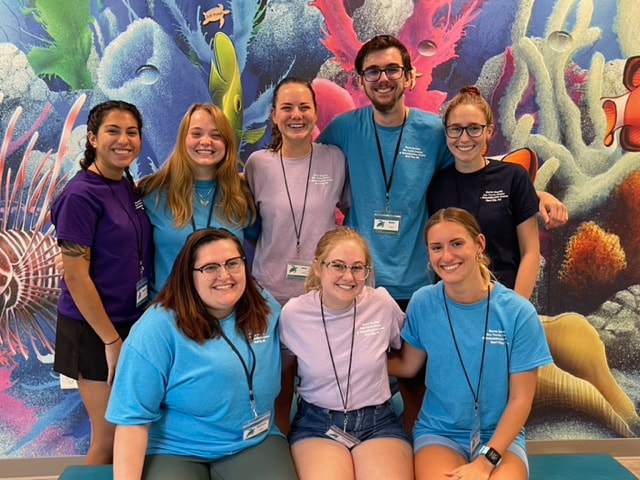

 RSS Feed
RSS Feed